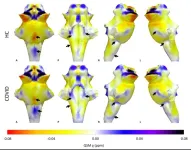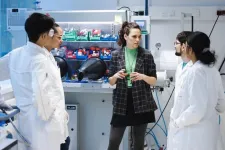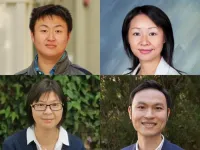(Press-News.org) A new study led by investigators at the UCLA Health Jonsson Comprehensive Cancer Center has revealed that common breast cancer treatments, including chemotherapy, radiation, and surgery, may accelerate the biological aging process in breast cancer survivors.
The findings, published in the Journal of the National Cancer Institute, show that markers of cellular aging—such as DNA damage response, cellular senescence, and inflammatory pathways—significantly increased in all breast cancer survivors, regardless of the type of treatment received. This suggests that the impact of breast cancer treatments on the body is more extensive than previously thought.
“For the first time, we're showing that the signals we once thought were driven by chemotherapy are also present in women undergoing radiation and surgery,” said study lead author Judith Carroll, an associate professor of psychiatry and biobehavioral sciences at UCLA, Endowed Chair for the George F. Solomon Professorship in Psychobiology and investigator in the UCLA Health Jonsson Comprehensive Cancer Center. “While we expected to see increased gene expression linked to biological aging in women who received chemotherapy, we were surprised to find similar changes in those who only underwent radiation or surgery.”
Advances in cancer therapies have greatly improved survival rates, with an estimated 4 million breast cancer survivors in the U.S. today and over 6 million expected by 2040. However, breast cancer is linked to accelerated aging, impacting physical abilities, independence, and lifespan. Biological aging processes, which drive conditions like fatigue, cognitive decline, frailty, and cardiovascular disease, appear to be a major factor. Evidence suggests that cancer treatments, like chemotherapy, can increase the risk of earlier onset of these aging-related conditions, making it crucial to understand the specific pathways involved to better target and manage them.
To examine how gene expression related to aging changes over time in women diagnosed with breast cancer, the team conducted a two-year longitudinal study that tracked women undergoing breast cancer treatment prior to receiving treatment and again following treatment to see how their biological aging markers evolved.
The team tracked the gene expression in their blood cells using RNA sequencing, focusing on markers that signal biological aging — including a process known as cellular senescence, which is when cells stop dividing but don't die. These so-called "zombie cells" accumulate over time and can release harmful substances that damage nearby healthy cells, contributing to aging and inflammation.
The data was then analyzed using statistical models to help identify aging-related changes.
The team found that regardless of treatment type there was an increase in expression of genes that track cellular processes involved in biological aging. Specifically, genes that capture cellular senescence and the inflammatory signal from these cells, indicating that their immune cells were aging faster than normal.
They also saw increases in DNA damage response genes, which are genes that are expressed when there is DNA damage. Although chemotherapy did have a slightly different pattern, similar to what others have shown, they also noted changes in women who did not receive chemotherapy.
“The results suggest women who receive treatment for breast cancer have a pattern of gene expression that indicates increased DNA damage and inflammation, which could be important targets for recovering from cancer and having a better quality of life in survivorship,” said senior author of the study Julienne Bower, professor of psychology in the UCLA College and psychiatry and biobehavioral sciences and member of the UCLA Health Jonsson Comprehensive Cancer Center.
"We’ve only just begun to understand the long-term consequences of cancer therapy and these findings are a critical step toward understanding the biological pathways that drive many post-treatment symptoms in breast cancer survivors,” added Carroll. “Our goal is to find ways to improve survivorship, not just in terms of years lived, but also in quality of life and overall health."
The team is now exploring a new biomarker that measures a woman's biological age and the pace at which she is aging. This could help determine whether the aging signals detected during cancer treatment have a long-term effect on biological age. The team plans to investigate factors that may influence this, with a focus on protective behaviors such as exercise, stress management and healthy sleep patterns.
Carroll and Bower also are affiliated the Cousins Center for Psychoneuroimmunology, and the Semel Institute for Neuroscience and Human Behavior at UCLA. Other UCLA authors include Catherine Crespi, Steve Cole, Patricia Ganz and Laura Petersen.
The study was supported by grants from the National Cancer Institute.
END
Study finds common breast cancer treatments may speed aging process
UCLA investigators found that regardless of treatment type — chemotherapy, radiation or surgery — there was an increase in the expression of aging markers
2024-10-08
ELSE PRESS RELEASES FROM THIS DATE:
Ultra-powered MRI scans show damage to brain’s ‘control center’ is behind long-lasting Covid-19 symptoms
2024-10-07
Damage to the brainstem – the brain’s ‘control centre’ – is behind long-lasting physical and psychiatric effects of severe Covid-19 infection, a study suggests.
Using ultra-high-resolution scanners that can see the living brain in fine detail, researchers from the Universities of Cambridge and Oxford were able to observe the damaging effects Covid-19 can have on the brain.
The study team scanned the brains of 30 people who had been admitted to hospital with severe Covid-19 early in the pandemic, ...
Despite progress, China remains tethered to coal as climate change pressures mount
2024-10-07
A new paper from the University of California San Diego details how China faces numerous political, economic and technological obstacles as it tries to transition away from coal—the country’s primary energy source—while balancing the need to combat climate change with the need for energy security.
Despite its commitment to "phase down" coal, China recently has been permitting and constructing coal plants at rates not seen in a decade.
“There is an increased focus on energy security in China—in 2021, the country experienced its worst power outages in decades, affecting ...
Open Call: Journalists in Residence Program at Institute of Science and Technology Austria (ISTA)
2024-10-07
The Institute of Science and Technology Austria (ISTA) is a PhD-granting research institute near Vienna. It was founded in 2009, with the bold ambition of providing the best possible environment to conduct innovative frontier research. It is dedicated to transcending traditional boundaries of disciplines, cutting-edge infrastructure, training the next generation of scientific leaders, and increasing the impact of science through science engagement as well as technology transfer. It is home to 82 research groups across all fields, ...
Small creatures, big impact
2024-10-07
Could the butterfly effect - in which a small change in one state of a system can result in large differences in a later state - also apply to the earth’s oceans, as well as its skies?
Some species of zooplankton are on the order of one millimeter, but don’t let their size fool you. It’s possible these small creatures can create quite a wave.
While it’s long been understood that large marine animals, like fish or whales, can stir up the ocean’s water columns, the impact ...
Researcher receives grant to enhance quantum machine learning education
2024-10-07
At a time when data are doubling every two years, the U.S. is projected to create over 40 billion gigabytes of data by 2025. To prepare for the influx, Kennesaw State University associate professor Yong Shi, an expert in quantum machine learning (QML), aims to unlock insights from the data surge and educate future QML researchers.
Shi, along with colleagues Dan Lo, professor of computer science, and Luisa Nino, assistant professor of industrial and systems engineering, recently secured a National Science Foundation (NSF) grant to develop open-source, hands-on QML training materials ...
Professor gives American grading system an F
2024-10-07
OXFORD, Miss. – America’s obsession with grades is failing students and jeopardizing the future of education, a University of Mississippi professor argues in his new book.
Josh Eyler, director of the Center for Excellence in Teaching and Learning, recently released “Failing Our Future: How Grades Harm Students, and What We Can Do About It” (Johns Hopkins University Press), in which he argues that the traditional system of grading is harmful to students.
“This book looks at the issues with grades in learning, the kinds of Issues grades ...
NIH awards $2.2 million to UMass Amherst to explore new tuberculosis therapies
2024-10-07
AMHERST, Mass. – The National Institutes of Health recently awarded $2.2 million to Alissa Rothchild, assistant professor in the Department of Veterinary and Animal Sciences at the University of Massachusetts Amherst and an expert in tuberculosis (TB) immunology, to study the very first cells that respond to Mycobacterium tuberculosis (Mtb), the bacteria causing TB.
How those initial cells, known as alveolar macrophages, or AMs, respond to the bacteria is not entirely known, though Rothchild and her lab have shown in a previous study that AMs don’t respond to Mtb infection the way other macrophages do. Instead of mounting a strong inflammatory response, AMs turn on a cell-protective ...
Immune-based treatment gets a boost to its cancer-fighting superpowers
2024-10-07
Imagine a world where your own immune cells are transformed into cancer-fighting superheroes. This is the promise of CAR-T cell therapy, a groundbreaking treatment that’s already saving lives.
In this therapy, patients’ own immune cells are collected, genetically engineered so that they specifically target cancer cells, then returned to the body. The result is a potent new option for battling blood cancers. However, as with any superhero journey, the process of harnessing this incredible power comes with ...
First report of its kind describes HIV reservoir landscape in breast milk
2024-10-07
Embargoed for release until 5:00 p.m. ET on Monday 7 October 2024
@Annalsofim
Below please find summaries of new articles that will be published in the next issue of Annals of Internal Medicine. The summaries are not intended to substitute for the full articles as a source of information. This information is under strict embargo and by taking it into possession, media representatives are committing to the terms of the embargo not only on their own behalf, but also on behalf of the organization they represent.
----------------------------
1. First ...
Penn Nursing study finds link between nurse work environment quality and COVID-19 mortality disparities
2024-10-07
PHILADELPHIA (October 7, 2024) – A new Penn Nursing Center for Health Outcomes and Policy Research (CHOPR) study – published in INQUIRY – has found a strong association between the quality of the nurse work environment and COVID-19 mortality rates among socially vulnerable Medicare beneficiaries. The study examined data from 238 acute care hospitals across New York and Illinois.
The researchers found that patients from socially vulnerable communities, including those facing higher levels of poverty, housing insecurity, and limited transportation, were more likely to die from COVID-19 if they were ...
LAST 30 PRESS RELEASES:
Striking genomic architecture discovered in embryonic reproductive cells before they start developing into sperm and eggs
Screening improves early detection of colorectal cancer
New data on spontaneous coronary artery dissection (SCAD) – a common cause of heart attacks in younger women
How root growth is stimulated by nitrate: Researchers decipher signalling chain
Scientists reveal our best- and worst-case scenarios for a warming Antarctica
Cleaner fish show intelligence typical of mammals
AABNet and partners launch landmark guide on the conservation of African livestock genetic resources and sustainable breeding strategies
Produce hydrogen and oxygen simultaneously from a single atom! Achieve carbon neutrality with an 'All-in-one' single-atom water electrolysis catalyst
Sleep loss linked to higher atrial fibrillation risk in working-age adults
Visible light-driven deracemization of α-aryl ketones synergistically catalyzed by thiophenols and chiral phosphoric acid
Most AI bots lack basic safety disclosures, study finds
How competitive gaming on discord fosters social connections
CU Anschutz School of Medicine receives best ranking in NIH funding in 20 years
Mayo Clinic opens patient information office in Cayman Islands
Phonon lasers unlock ultrabroadband acoustic frequency combs
Babies with an increased likelihood of autism may struggle to settle into deep, restorative sleep, according to a new study from the University of East Anglia.
National Reactor Innovation Center opens Molten Salt Thermophysical Examination Capability at INL
International Progressive MS Alliance awards €6.9 million to three studies researching therapies to address common symptoms of progressive MS
Can your soil’s color predict its health?
Biochar nanomaterials could transform medicine, energy, and climate solutions
Turning waste into power: scientists convert discarded phone batteries and industrial lignin into high-performance sodium battery materials
PhD student maps mysterious upper atmosphere of Uranus for the first time
Idaho National Laboratory to accelerate nuclear energy deployment with NVIDIA AI through the Genesis Mission
Blood test could help guide treatment decisions in germ cell tumors
New ‘scimitar-crested’ Spinosaurus species discovered in the central Sahara
“Cyborg” pancreatic organoids can monitor the maturation of islet cells
Technique to extract concepts from AI models can help steer and monitor model outputs
Study clarifies the cancer genome in domestic cats
Crested Spinosaurus fossil was aquatic, but lived 1,000 kilometers from the Tethys Sea
MULTI-evolve: Rapid evolution of complex multi-mutant proteins
[Press-News.org] Study finds common breast cancer treatments may speed aging processUCLA investigators found that regardless of treatment type — chemotherapy, radiation or surgery — there was an increase in the expression of aging markers





